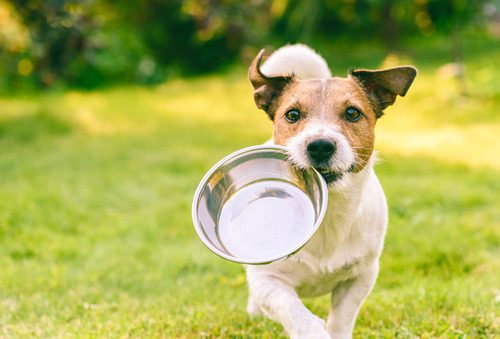Why Won’t My Dog Stop Drinking Water?
Water is essential for your dog’s health, but if your dog won’t stop drinking water, you may be wondering if something is wrong. While some dogs naturally drink more than others, excessive thirst—also known as polydipsia—can indicate an underlying issue. From diet changes to medical conditions, several factors can contribute to increased water consumption. If your dog is drinking an excessive amount of water and you’re concerned, call Frontier Veterinary Urgent Care at 262-226-2055.

How Much Water Should a Dog Drink Daily?
A healthy dog typically needs about one ounce of water per pound of body weight per day. This means a 50-pound dog should drink around 50 ounces (about six cups) of water daily. However, activity levels, diet, and weather conditions can affect water intake. Dogs who eat dry kibble may drink more than those on wet or raw food diets because kibble contains less moisture. If your dog won’t stop drinking water and exceeds the normal range, tracking their water intake for 24 hours can help determine if their thirst is excessive.
Possible Reasons Your Dog Won’t Stop Drinking Water
If you notice your dog is constantly drinking, several potential causes could explain this behavior. Some are harmless, while others may require veterinary attention.
Increased Activity or Warmer Temperatures
Dogs naturally drink more when they exercise or when the weather is hot. If your dog has been playing outside, going on longer walks, or spending time in warm conditions, they may simply be rehydrating. In these cases, their thirst should return to normal once their body cools down.
Dietary Factors
A diet high in sodium or dry kibble can cause your dog to drink more water. If your dog recently switched to a new food or has been eating salty treats, their thirst may temporarily increase. Check the ingredients in your dog’s food and treats to see if sodium levels could be a factor.
Anxiety or Stress
Just like humans, dogs can respond to stress with physical behaviors, including excessive drinking. If your dog is experiencing anxiety due to a change in routine, separation anxiety, or loud noises, they may drink water as a coping mechanism. Other signs of stress include pacing, whining, and excessive panting.
Medical Conditions That Cause Excessive Thirst
If your dog won’t stop drinking water and the behavior persists for more than a day or two, an underlying health condition could be responsible. Several medical issues can lead to excessive thirst, and an urgent care veterinarian can help determine the cause.
Diabetes Mellitus
Diabetes occurs when a dog’s body does not produce enough insulin or becomes resistant to it, leading to high blood sugar levels. One of the most common symptoms of diabetes in dogs is excessive thirst, along with increased urination, weight loss, and lethargy. If left untreated, diabetes can lead to serious complications.
Kidney Disease
The kidneys play a crucial role in filtering waste from the blood and regulating fluid levels. When the kidneys aren’t functioning properly, they lose the ability to concentrate urine, causing increased water intake and frequent urination. Dogs with kidney disease may also experience vomiting, lethargy, and loss of appetite.
Cushing’s Disease
Cushing’s disease is a hormonal disorder caused by excess cortisol production. This condition can make dogs excessively thirsty and hungry, leading to weight gain, hair loss, and frequent panting. Cushing’s disease is more common in older dogs and may require long-term management.
Urinary Tract Infections (UTIs)
A UTI can cause a dog to drink more water due to inflammation and irritation of the bladder. Other signs of a UTI include straining to urinate, accidents in the house, and licking the genital area. UTIs are usually treated with antibiotics and should be addressed promptly to prevent complications.
Liver Disease
The liver helps regulate hydration and metabolism. If your dog has liver disease, excessive thirst can develop alongside symptoms like jaundice (yellowing of the skin or eyes), vomiting, and poor appetite. Liver disease can be caused by infections, toxins, or congenital conditions.
Red Flags Indicating It’s Time to Seek Veterinary Care
If your dog won’t stop drinking water and shows additional symptoms such as:
- Increased urination
- Weight loss
- Vomiting or diarrhea
- Lethargy or weakness
- Appetite changes
it’s time to seek veterinary attention. Sudden, excessive thirst is not always normal and could indicate a serious health issue. An urgent care veterinarian can run diagnostic tests, including blood work and urinalysis, to determine the cause of your dog’s increased water intake.
Helping Your Dog Maintain Healthy Hydration
While it’s important for dogs to stay hydrated, excessive drinking can be a sign of an issue that needs to be addressed. Here are some ways to help regulate your dog’s water intake and overall health:
- Track how much water your dog drinks in a day to determine if it’s excessive.
- Ensure your dog’s food and treats are not excessively high in sodium.
- Always offer clean, fresh water in a clean bowl to encourage healthy hydration.
- : If your dog is drinking excessively, offer smaller amounts throughout the day rather than free access to a large bowl.
If you are concerned about your dog’s drinking habits, the expert team at Frontier Veterinary Urgent Care can help determine a diagnosis and provide you with peace of mind. Call 262-226-2055 for guidance.
